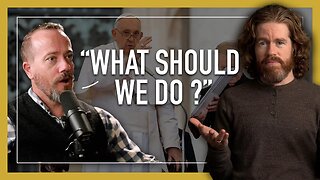Premium Only Content

The Toxic Influence of News Media
Support the Channel - join the Reinforcements: https://brianholdsworth.ca
Music written and generously provided by Paul Jernberg. Find out more about his work as a composer here: http://pauljernberg.com
Take a moment and try to remember what happened in your life yesterday. What did you do, who did you see, what happened to you. And then ask yourself, why do you think that there aren’t reporters and journalists camped outside your house waiting to get the scoop.
Unless you’re one of the rare exceptions, your day probably doesn’t qualify as newsworthy. But why not? Your life is just as much an accurate depiction of the life of a 21st century human as any others.
In fact, your day is probably the most accurate depiction. The person who had something absurd happen to them is the sensational rare exception and it is precisely that that the news media gravitates towards with salivating anticipation.
And this is because the purpose of the media is to sell a product – not to educate or inform the public. So, they choose the most sensational stories they can find and when they can’t find any, they insinuate the stories are much more provocative than they are with the headlines. When you actually read the article, you discover that the events being reported are much less salacious than implied.
So, other than the fact that it’s a dishonest portrait of daily life, what’s the problem with a little sensationalism. Well, the first is that it creates a perception, among the public, that things are much worse than they are and in need of our preoccupation if not urgent attention.
The emphasis on all the exceptional events, misleads the voting public into thinking that those exceptions are the norm, and therefore pervasive. But imagine if, in order to find the story about police brutality, you had to read literally 10s of thousands or 100s of thousands of incidents in which an officer helped someone, spoke politely to a minority person, or went about doing the mundane tasks of everyday life: directing traffic, giving someone a ticket, patrolling a street, etc.
If you had to read through all of that, you would likely give up long before you came across a story about abuse of power and, therefore, wouldn’t even know that such things occurred unless you had first hand experience of it. And if, after reading, thousands of stories of what normally happens, how easily do you think you could be convinced that we should defund the police for systemic problems?
You’d probably think that was absurd but yet, it is topics like this which consume all of our attention and dominate our political discourse, even in countries where the so-called problem is even more rare (like where I live).
This is the phenomenon of narrative and it is incredibly insidious in its ability to divide and polarize society. Because the thing about narrative is, that if you selectively curate the incidents that you want to discuss, you can make anything you want seem like it’s true, whether it is or not.
And this leaves the door open for any number of destructive ideologies which are, at their base, fundamentally wrong, but can appear to be valid by the apparent confirmation found in loosely constructed narratives.
We even do this with our perception of history. I was raised and educated thinking that prior to the French revolution, society was ignorant, brutal, superstitious, and oppressive.
Every historical event that we learned about in school, that goes back that far, is something like the crusades or the Spanish inquisition and even with those, they had to exaggerate the brutality or injustice to make them appear far worse than they were – which is how we end up with something like the Spanish Black Legend – which if you haven’t heard of, I strongly encourage you to google.
This is how movies like Braveheart, which I’ve always enjoyed, can be passed off as if it’s an accurate depiction of the Middle Ages – when in fact, the vast majority of details depicted in that movie are hilariously inaccurate.
Imagine how easy it would be for the generations that succeed us (if there are any) to depict the life of a 20th century person as nothing but genocide, war, pollution, economic uncertainty, and political oppression.
You could selectively choose to discuss only the incidents that characterize those things while ignoring the rest, and yet, I have little to no firsthand experience of any of those things.
This is one of the many many reasons I don’t give journalists, newspapers, or the mainstream media any credibility. I simply don’t believe the portrait that they are weaving.
Because their intentions, their purpose and ends in publishing the information that they do, is far removed from the purpose you might have in reading it. Your purpose might be to get informed. Their purpose, is to sell advertising.
Read the full transcript at brianholdsworth.ca
-
 11:57
11:57
Brian Holdsworth
1 year ago $0.09 earnedWhat Should Catholics Do?
4512 -
 DVR
DVR
Alex Zedra
4 hours agoLIVE! CoD tonight :D
11.3K2 -
 1:31:19
1:31:19
AimControllers
2 days ago $6.39 earned🔴LIVE - THE PRE GAME LOBBY PODCAST
47K10 -
 2:17:32
2:17:32
megimu32
5 hours agoOTS: Born to Grill, Raised on Fireworks - 4th of July Throwbacks
26.2K13 -
 LIVE
LIVE
IcyFPS
2 hours ago32 days left in Ranked.. How far do we get?!
314 watching -
 LIVE
LIVE
JdaDelete
1 day ago $0.09 earnedThe Legend Of Zelda Breath of the Wild | July Gone Wild #3
37 watching -
 5:27:59
5:27:59
OhHiMark1776
7 hours ago🟢 07-03-25 ||||| Dur ||||| Baldur's Gate 3 (2023)
6.63K2 -
 13:47
13:47
Adam Does Movies
6 hours ago $0.57 earnedJurassic World Rebirth - Movie Review
12.9K6 -
 51:55
51:55
The Finance Hub
7 hours ago $3.59 earnedBREAKING: DONALD TRUMP JUST SHOCKED THE WORLD!
19.3K19 -
 7:57:32
7:57:32
Right Side Broadcasting Network
9 days agoLIVE REPLAY: President Trump's America250 Kick-Off Rally at the Iowa State Fairgrounds - 7/3/25
351K75